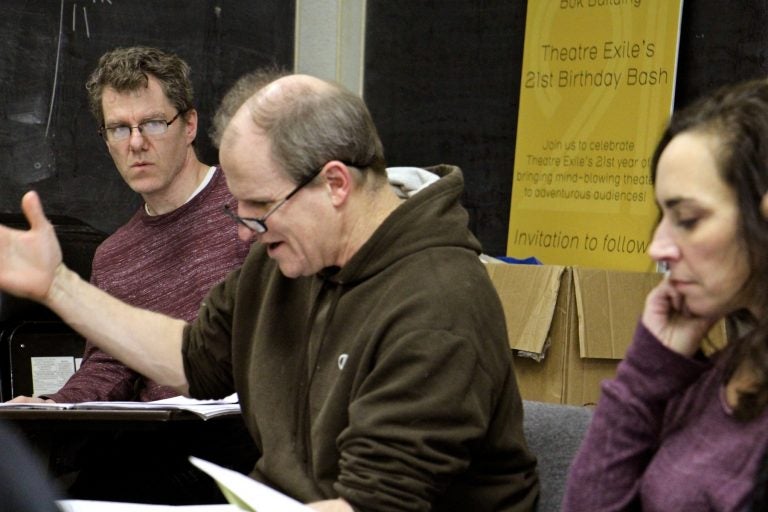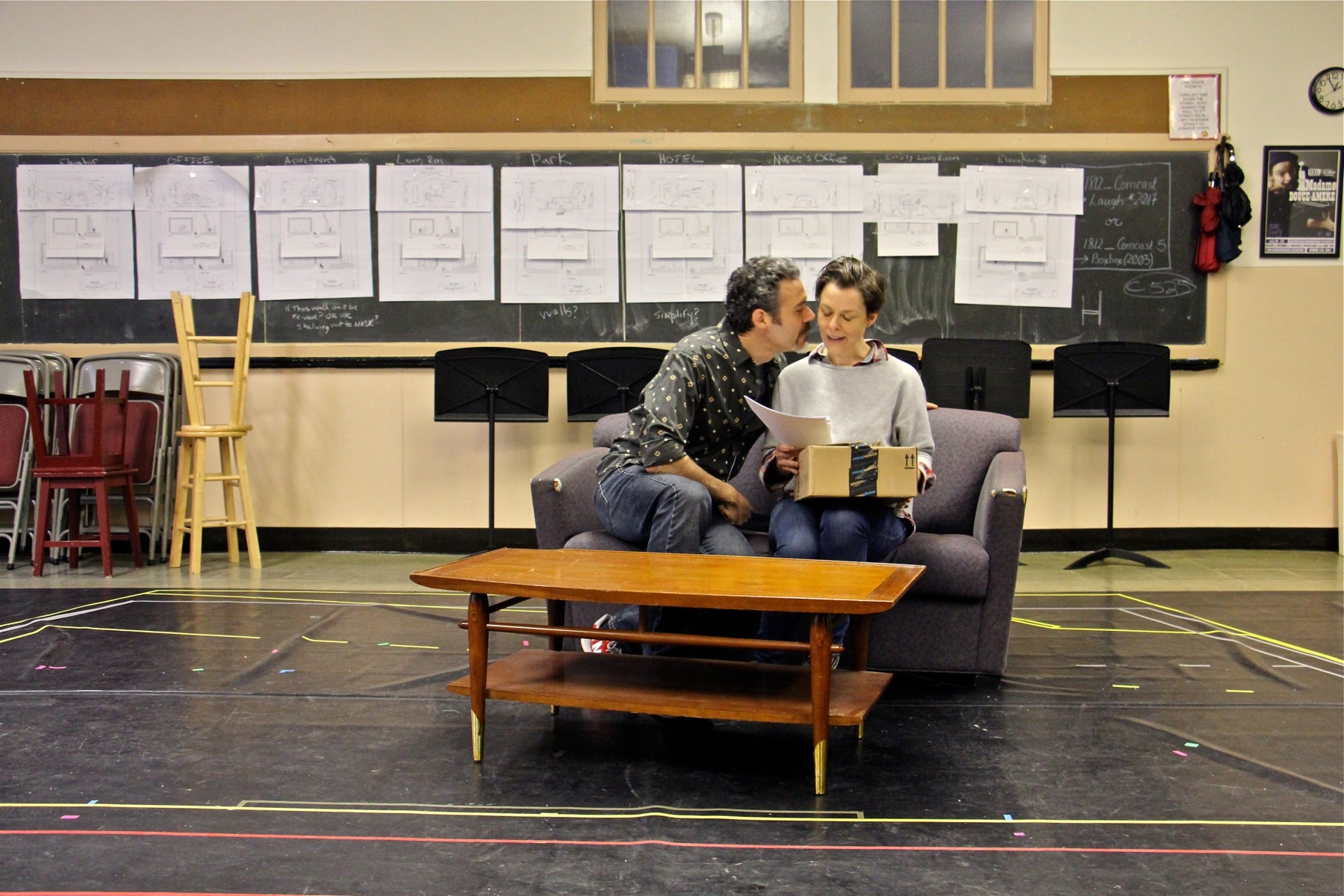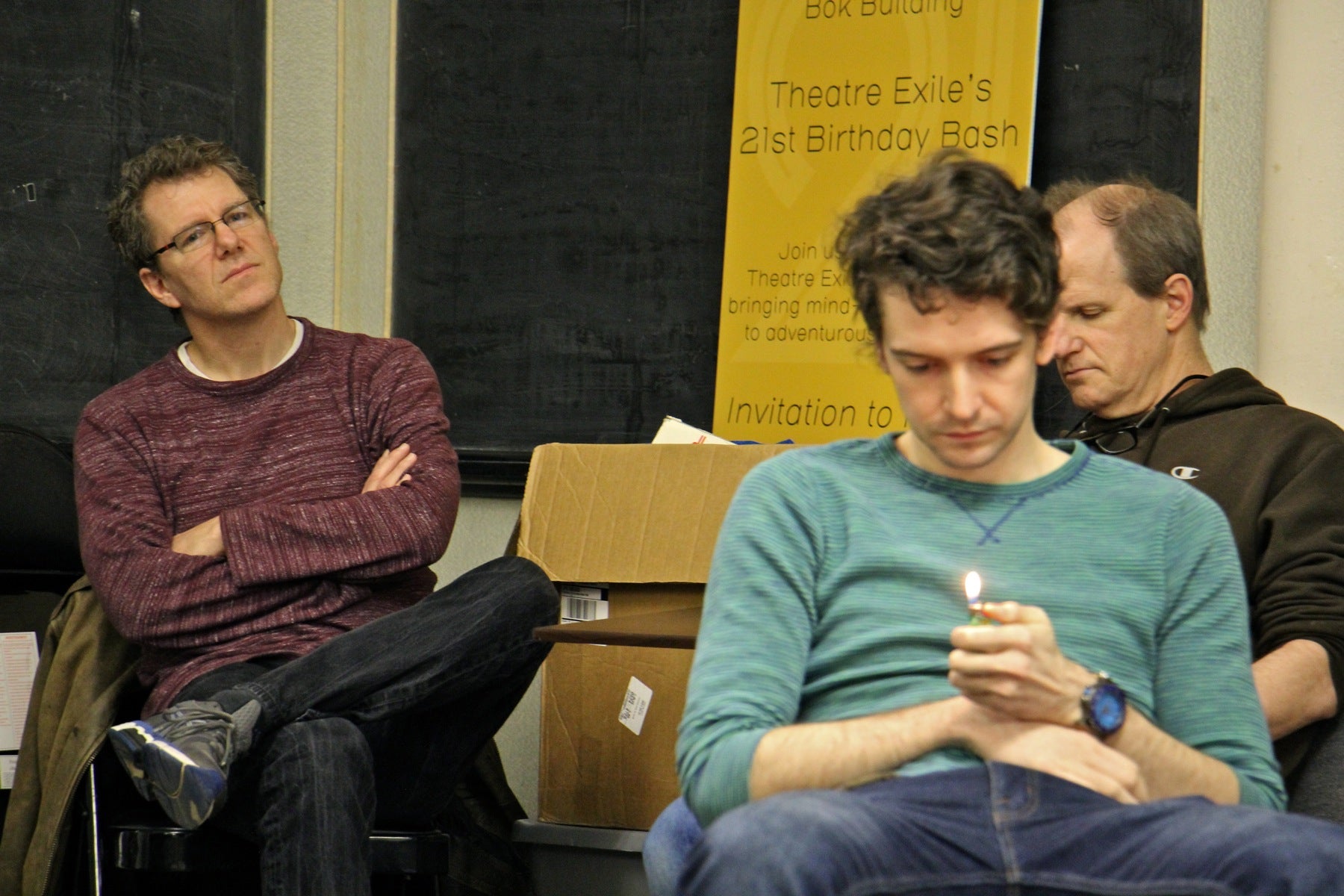Playwright wears masks of comedy, tragedy simultaneously in Philly
Playwright Michael Hollinger is now rolling out two plays — a comedy, and a drama — and holding rehearsals for each in the same building.
Listen 2:36
Playwright Michael Hollinger (left) listens to a first read of a new script during rehearsal for his drama, "Sing the Body Electric," being staged by Theatre Exile. (Emma Lee/WHYY)
Two Michael Hollinger plays — a comedy and a drama — will be produced this month by two different companies rehearsing on different floors of the same building in South Philadelphia.
In a second-floor classroom of the former Our Lady of Mount Carmel Catholic school, 1812 Productions has been rehearsing “Hope and Gravity.” The comedy involves many disjointed scenes held together by a network of interrelated characters and one tragic elevator accident.
With an armful of one-act plays he’s written over the years, Hollinger said he wanted to string them together into a single cohesive story.
“I wanted a dim sum experience that felt like a seven-course meal, where you felt the power of narrative,” he said of “Hope and Gravity,” which premiered in 2014. “There are elements of randomness that is thematically important to the play. It’s jumping forward in time, jumping backward in time. Part of the pleasure — part of our job as audience members — is to assemble the parts of the play.”
After giving notes to director Jennifer Childs on a particularly farcical scene about managing a marital infidelity, Hollinger left.
“I feel like a bigamist,” he said. “I’m saying, ‘I’ll see you tomorrow because I have to go upstairs to my other wife.’ ”

Upstairs, Theatre Exile is preparing the premiere of “Sing the Body Electric,” a drama about complicated relationships that develop after a tragic strike of lightning.
“All my plays are personal, but it takes a while to discover why,” said Hollinger. “I start with ideas that are abstract or alien to me. Over time, it’s, ‘Oh, this is why I wrote it — not because of that thing over there, but this thing very close to home.’”
In the play, a teenage couple makes out, for the first time, in a field. Then lightning strikes. Literally. It might be absurdly funny if it weren’t horrible. The girl dies. The boy is left with scars both emotional and topical: he has Lichtenberg figures burned into his skin, resembling a lightning fractal pattern.
“I didn’t know anything about lightning strikes until I stumbled on a national organization for survivors of lightning strikes,” said Hollinger. “Do enough people survive these to need a support group? Indeed.”
Hollinger wrote a play about attempts to foster new romantic relationships in the aftermath of romantic disaster. What had started out with a concept out of left field, became personal.
“I occurred to me, observing my son and his first girlfriend — absorbing that and casting my mind back to that age — what does it mean to be a middle-aged person observing teenagers and also finding another person and checking them out?” said Hollinger.

A well-established playwright who also teaches at Villanova University, Hollinger has always put comedy in his dramas and drama in his comedies. Laughter, in the right hands, can be a key to open vulnerabilities in audience members. Once there, drama finds fertile ground. He describes it as, “Ha. Ha. Ouch.”
The two plays have nothing to do with one another. They were written years apart, with totally different stories and ideas. Together, they involve more than two dozen characters, about as many story lines, many out of chronological order.
It can be hard to juggle everything in his head as he moves between floors, but Hollinger sees it as an opportunity to make each play tighter.
“To go away and come back lets me be an audience member again,” he said. “To leave one floor in one play and go up and enter another play, it’s refreshing. It gives me added perspective. It lets me be an outsider to something I’ve been sitting with for years.”
It’s a big year for Hollinger on Philadelphia stages. “Sing the Body Electric” and “Hope and Gravity” are just the latest in production this season in the region — “Touch Tones” at the Arden Theater and “Red Herring” at Act II Playhouse ran simultaneously in the fall. In February, the Annenberg Center hosted a dramatic reading of “Opus” accompanied by the Daedalus Quartet.
Hollinger joked that he must have a fatal disease that nobody told him about, and local theater companies must have collectively decided to program a retrospective of his work as a way of giving him a big send-off.
Ha. Ha. Ouch.
WHYY is your source for fact-based, in-depth journalism and information. As a nonprofit organization, we rely on financial support from readers like you. Please give today.





